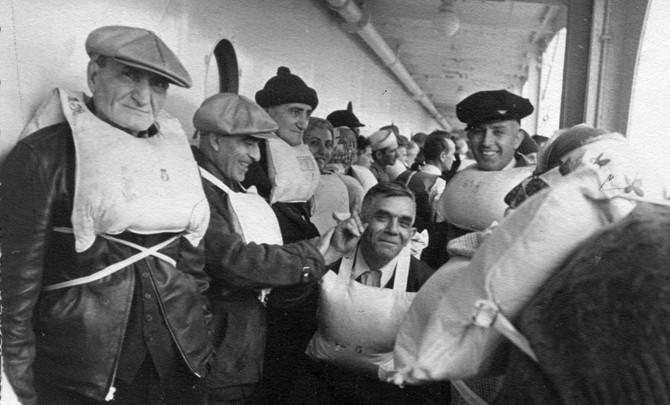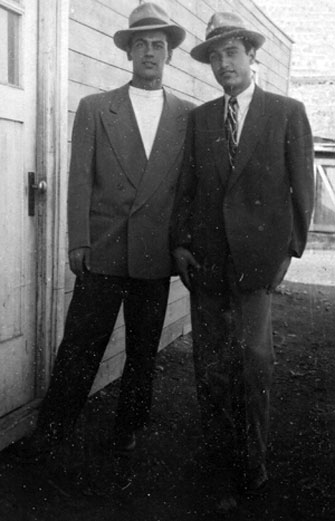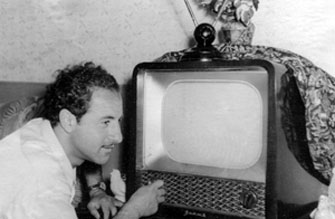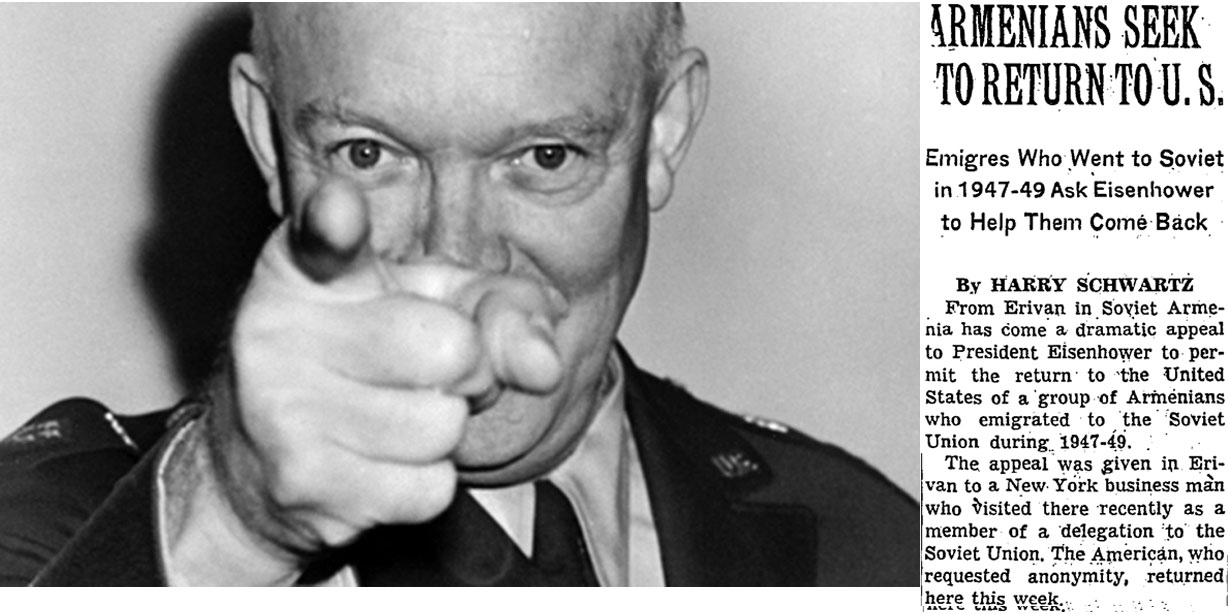
1940s Repatriation: Armenian Americans Send Letter to President Eisenhower, Requesting Return
In 2011, we started the project called “Coming Full circle”, dedicated to the Mass Repatriation, by looking for families in Armenia, immigrated from different countries. There were families from everywhere, except from the USA.
It seemed strange to us: wasn’t there at least one Armenian American family in Armenia? We tried to understand the reason of their absence.
In 1947 and 1949, 313 people moved to Soviet Armenia from the United States of America, by two caravans (respectively 151 and 162 people). According to archive documents, the Soviet Armenia authorities (doubtlessly, with Moscow’s consent), showed special care for Armenian American repatriates, by accommodating them in the capital and providing housing. And that was, when other immigrants, without being asked about who they were, about their profession and craft, were being sent to remote (agricultural, cattle-breeding) regions, and instead of providing housing for them, they were being squeezed into already narrow houses of local people.
Such kind of care towards former citizens of the USA was conditioned by noticeable strained relations between the Soviet Union and the USA. In March 12, 1947, the U.S. President Harry Truman, former ally of the Soviet Union, had published his famous doctrine, one or most important goals of which was the limitation of the Soviet Union’s influence. Thus, in fact, Moscow’s plan to occupy territories from Turkey (Kars, Ardahan) and to unite them to Soviet Armenia was closed, which was an encouraging and consolidating factor for immigrants.

Nevertheless, Armenian Americans, though few, but were a mass, testifying Soviets supremacy. Mass, which in spite of consistent preparedness, had neither real idea on host country, nor on political and legal orders prevailing in it.
During the immigration preparations, there was some enthusiasm among Armenian American communities, but compared to other countries, the Armenians there were restrained and cautious, or rather they were practical while making decisions, the proof of which are the documents conserved in the national archives of the RA.
The panel, supporting immigration of Armenian Americans of the USA wrote in its letter addressed to Astvatsatryan, head of committee of reception and accommodation of foreign Armenians adjunct to the Council of Ministers of the Armenian SSR: “Most people, personally or by means of letters, ask questions, which concern the organization of personal, family and material conditions (in Armenia)”. Captain Changalyan, the head of the panel, and doctor Bnakuni, the secretary, ask Astvatsatryan to clarify a number of the following issues.
The first group of questions, which try to find out voltage and power of electric energy in Soviet Armenia, is obviously related to Armenian Americans intention to start a business in Homeland, especially when the letter presents their readiness to organize production artels, to import equipment.
The other group concerns housing conditions. People ask about new houses, their internal furniture, cost, and winter heating ways. Also they are interested in rent rates.
The two last questions are from civil law sphere: “Can the Soviet Armenia immigrant go back, if he/she doesn’t want to stay?” and “How long can he/she stay in Armenia, and if he/she wants to stay, can he/she become Soviet citizen?”

Soviet officials were giving detailed answers to them, avoiding this kind of questions. They were not likely to understand or they pretended not to understand the meaning of “if they want to stay” expression. The Soviet totalitarianism did not tolerate “ifs”: if you come, you should stay. Period!
This, of course, was complicating the panel’s mission of organizing immigration on the spot and, at the same time, repulsing “the reluctants”. In September 24, 1946, the panel supporting immigration of Armenians of the USA, circulated a message entitled “Clarifications on immigration, N 2”, which was supposed to answer all the questions of people willing to immigrate.
The last, 14th question of the message is the following: “Can a resident of Soviet Armenia or an immigrant go abroad to meet his/her relatives or for other reason?” The answer follows: “Yes, a resident of Soviet Armenia or an immigrant can go abroad any time to meet his/her relatives or for other reason. For this, he/she should submit a request to the Ministry of Foreign Affairs, filling in an application the way it is done in the USA, England, and France and in all free countries”. On behalf of the panel, the message is signed by Doctor Bnakuni, the head-secretary.
As there are no such other assurance-confirmations in the documents of Soviet Armenia authorities, and we have already witnessed that unwanted questions had been avoided, we can suppose, that Bnakuni tried to dispel doubts of people. The message ends with the following paragraph: “As regards this, we would like to once more sincerely warn the public not to believe in inappropriate, ill-intentioned and even hostile rumors reigning in various classes of the population, the only aim of which is to cause harm to the cherished mission of immigration by messing up people’s minds. Those, who want to get information on immigration or Soviet Armenia, should solely address to the Armenians’ immigration head office. It is better to drink the water from the clean bank”.
This water, drank from the “clean bank” strengthened the idea among many immigrants, especially the youth, that they would live in the Soviet Union as free and easy, as in the USA, without having any obstacle or difficulty to leave the host country “for any reason and any time” or to choose citizenship.
 Tiran Tashchyan, immigrated from the USA in 1947 and now residing in Pasadena (California, USA), recalls: “I was against, then my mom persuaded me, that we should leave. She said I’d do well at school, I’d learn Armenian, etc. Back then I thought I’d keep on leaving and coming back after graduating”.
Tiran Tashchyan, immigrated from the USA in 1947 and now residing in Pasadena (California, USA), recalls: “I was against, then my mom persuaded me, that we should leave. She said I’d do well at school, I’d learn Armenian, etc. Back then I thought I’d keep on leaving and coming back after graduating”.
But the reality was quite different and bitter. Coming to the Soviet Union, the former citizens of the United States found themselves in a cage. It is true that, according to our data, only 12 (4%) out of 313 Armenian Americans underwent political persecution and violence, passing long years in the Soviet prison camps, and though none of them had ever been a part of the mass exile (1949, June 14), the offence of deception remained in almost all of them.

Three years later after Stalin’s death, in June 1956, a group of Armenian Americans addressed the US President Dwight D. Eisenhower, remorseful, asking to be granted a possibility to leave the Soviet country.
To the President of the United States of America
Dwight D. Eisenhower
Washington D.C.
An appeal
We, undersigned American citizens left our country, the United States of America, in November, 1947-49 and came to Armenia, in the U.S.S.R.
None of us departed with any ill feeling, dissatisfaction or disheartment towards America. But, on the contrary, having found there the freedom and sanctuary, the progressive spirit, the energetic creativeness and ingenuity, which our ancestors had dreamed and fought and lost (like many other oppressed people) we felt inspired to pioneer to the East, believing this to be the era of the brotherhood of man, especially after a global war had been fought, hand in hand with many countries, including Russia, against tyranny. Certainly in peace a greater understanding will come. For this we came as self appointed ambassadors of good will.
Diring the last nine years we have done our utmost, ander the most trying conditions and rstrictions to serve truth and show whomever we came in contact that Americanism is synonymous with sportmanship, human liberties, precise methods in production and better living conditions for all. We repeat that we have gone thru all manner of hardships and discrimination to maintain our sustenance, but the greatest of our suffering has been the lack of Freedom and Justice. It is solely this reason for which we and our children cannot adept ourselves to this mode of life and remain here.
Many among us tried to get in touch with our ambassador since 1948, for which attempt they were arrested and exiled from 10 to 15 years, often without trial. Included were boys of 17, young girl 18, woman an men.
We now appeal to the magnanimity of the government of the United States, to forgive us, her errant children, who want to return home. We feel we have paid the penalty of our mistake and we did our American born children a great injustice in depriving them of their right to live as Americans.
In closing we plead for precaution and not to expose us to publicity until such time as you think safe. For the threat of Siberia is ever imminant. Also if you ever hear or receive anyting that we are not desirous to return, please understand that such a paper forged or forced upon us.
The published letter is conserved in the President Eisenhower’s archives. In July 20, 1956, some parts of it appeared in “Armenians seek to return to U.S.” article of “New York Times” newspaper.
Translator Siranush Yesayan
………………………….
This article is prepared as part of the “Two Lives: The Cold War and the Emigration of Armenians” project financed by National Endowment for Democracy (NED).
 Videos
Videos Photos
Photos
Write a comment